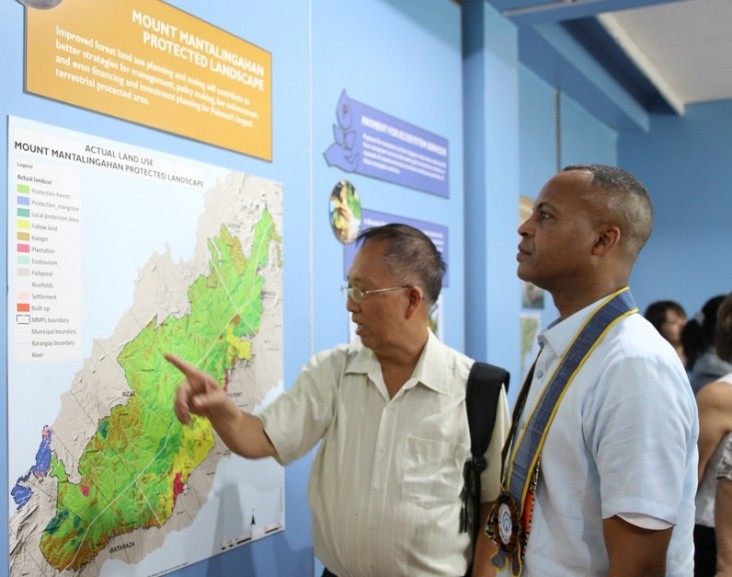Speeches Shim

[As Prepared]
[Greetings]
I have experienced mixed feelings today seeing the different species of wildlife animals here at the Palawan Wildlife Rescue and Conservation Center: It is disheartening to learn that these animals have to be kept from their natural habitat in order to protect them from poachers. At the same time, I am proud to note the heroic efforts of our partners in the Department of Environment and Natural Resources, the Palawan Council for Sustained Development, wildlife law enforcement teams, local governments and communities in protecting these magnificent animals.
The Philippines is one of the world’s 17 mega biodiverse countries, which together contain two-thirds of the earth’s biodiversity and up to 80 percent of the world’s plant and animal species. Billions of people around the world rely on forests, wildlife, and fisheries for their livelihoods. When we lose wildlife, we lose essential tools in our mutual goals to drive down poverty. This is why the U.S. government recognizes the essential role of biodiversity conservation in achieving our goal to help build prosperous, stable and equitable societies.
Almost one year ago in Metro Manila, Ambassador Kim joined then-Secretary of the Department of Environment and Natural Resources, Gina Lopez, and Senator Cynthia Villar in launching USAID’s Protect Wildlife project. I am pleased that in less than a year, our new partnership has made significant gains in protecting wildlife and their habitats not only here in Palawan, but also at other sites throughout the country. Already, through our Protect Wildlife project, we have together reached almost 2,700 people through behavior change communication campaigns and secured $100,000 in private sector investments for anti-wildlife poaching. We have also improved the management in three protected areas covering over 140,000 hectares, which is approximately twice the size of all of Metro Manila.
Combating wildlife trafficking is an important issue for the United States government. In October 2016, the U.S. Congress passed the Eliminate, Neutralize, and Disrupt, or “END,” Wildlife Trafficking Act. The law bolsters global anti-poaching work and strengthens the capacity of partner countries, such as the Philippines, to counter wildlife trafficking. In February 2017, President Trump signed an executive order that calls for strengthened federal law enforcement with respect to transnational crimes, including wildlife trafficking. As a result, the U.S. government intensified its support for Filipino civilian law enforcement officers working in wildlife trafficking investigation, including those from the Palawan Council for Sustained Development.
This is my first time visiting Palawan, and while I have yet to see all of the sights here, I am already so amazed at the region’s incomparable beauty. Palawan illustrates the intricate relationship between biodiversity and development. Its landscapes and seascapes serve as home to more than one hundred vulnerable, threatened and endangered species of flora and fauna, as well as to more than one million Filipinos who depend on its rich habitats for food, water, livelihoods, and other life-sustaining ecosystems.
The U.S. government treats poaching, trafficking, and illegal trade of wildlife and its by-products as a serious matter. Wildlife trafficking is not only an environmental issue that threatens the survival of various species, it also threatens our security, the rule of law, economic opportunities, and even our quality of life as wildlife trafficking can put our dependence on nature and biodiversity at a great imbalance.
Guided by decades of conservation experience, USAID continuously invests in people, builds partnerships, and spurs innovations to preserve our world’s precious biodiversity.
USAID also values our strong collaboration with our partners in Palawan. With such complex challenges to halt biodiversity loss and stop illegal wildlife trade, the only way forward is the collective action of the government, universities, civil society, and the private sector. By working as one, the successes and lessons we gain as partners can elevate Palawan as a national and global model for conservation-oriented sustainable development.
I am confident that this partnership between the U.S. and Philippine governments — together with the private sector and other partners — can help preserve the region’s precious wildlife, habitats and natural resources so the future generations can benefit from and enjoy them.
We look forward to continuing our journey with you as we pursue a sustainable, inclusive path to development that protects our precious environment and the lives that depend on it.
Maraming salamat sa inyong lahat! (Thank you so much to everyone!)

Comment
Make a general inquiry or suggest an improvement.